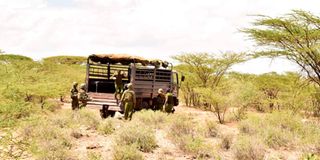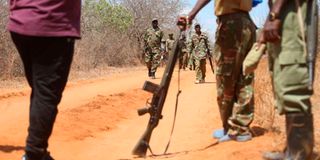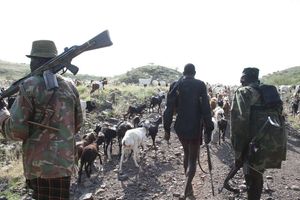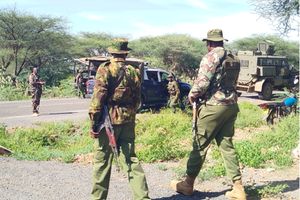
Police officers retrieve bodies from the Suyian battlefield in Samburu North after an attack by bandits.
The recent arrest of 25 National Police Reservists (NPRs) in Baringo County has exposed the dark underbelly of a security strategy that was meant to stabilise volatile regions in the North Rift — but is now being linked to worsening criminal activity.
Interior Cabinet Secretary Kipchumba Murkomen made the revelation during a security meeting in Kampi Samaki, Baringo North, a fortnight ago, confirming that the arrested NPRs were implicated in a spate of attacks in Kerio Valley.
“We deployed NPRs to supplement regular police operations, but instead of enhancing security, some have turned into criminals,” said Mr Murkomen.

Interior CS Kipchumba Murkomen (right), Rift Valley Regional Commissioner Abdi Hassan (left) and other security chiefs at a Kampi Samaki Hotel in Baringo where a security meeting was to be held on May 2, 2025.
“We have arrested and dismissed more than 25 reservists found to be linked to insecurity incidents in the region.”
Mr Murkomen said the government would conduct fresh vetting and retraining of all 2,277 NPRs in the North Rift to weed out rogue elements.
Those who survive the vetting will be subjected to strict oversight and made to report directly to the Officer Commanding Station (OCS) to ensure accountability.
“We are going to re-vet and train them afresh. We do not want to train a militia who later go and engage in criminal activities. Because they agreed to work with the police service, if they engage in criminality, they will be the most sought criminals,’ added Mr Murkomen.
The arrest of the officers has sparked an outcry from residents and leaders who say the government’s well-intended policy of arming reservists has backfired — giving guns to civilians who now use them to commit crimes.
“The NPRs were meant to protect us, but many have become the very threat we feared,” said Jackson Sertoi, vice chair of a drivers' association in Marigat Town.
“Drivers have been shot dead and others injured. We can't live under siege from those supposed to protect us.”
Mr Sertoi questioned the logic of arming more civilians in a region already awash with illegal firearms.
“Instead of disarming everyone, the government handed out more guns under the guise of curbing insecurity. What’s the point when even criminals now wear the badge of reservists?” he posed.
"Misguided policy"
The issue has also reignited debate among security experts. Colonel (Rtd) Moses Kwonyike said the policy of arming NPRs was misguided from the start, warning that rogue officers could now exploit their training and knowledge of security operations for criminal ends.
“You've trained them and now you're releasing them into the wild. That’s a recipe for disaster,” he warned.
Lawyer David Kipruto echoed those concerns, arguing that sacking the rogue reservists without a rehabilitation or reintegration plan could worsen the situation.
“These men are now trained, disgruntled and armed. Pushing them out without a fallback mechanism will only create room for revenge or even political exploitation,” said Kipruto.

Kenya Police Reservists on November 19, 2021 at the scene where three terror convicts who escaped from Kamiti Maximum Security Prison were arrested.
The government first introduced NPRs in the region in 2016, deploying more than 450 of them alongside regular police officers in Baringo North, Baringo South, and Tiaty sub-counties to help quell cattle rustling and banditry. However, the program has long been dogged by allegations of poor vetting and political interference.
In 2019, the government disarmed the entire cohort, citing concerns that many NPRs were aligned with politicians and had abused their positions. A biometric registration and vetting exercise was launched, but calls from local leaders for their reinstatement eventually led to the rearming of over 200 NPRs in 2023.
Baringo County Police Commander Julius Kiragu, who graced the launch of the training at in 2023, said the recruits went through thorough vetting by administrators before their names were submitted for recruitment.
“We commenced the training of the NPRs, an exercise that will continue for one month. The 200 cohorts will be equipped with paramilitary skills to deal with bandits wreaking havoc in the porous villages in Baringo North and Baringo South Sub-Counties,” said Mr Kiragu at the time.
He indicated that they also took the fingerprints of the individuals during vetting to ensure that they recruited the right people who cannot engage in crime, noting that among those who passed the tests had served in the past before they were disarmed in 2019.
Despite promises of stricter oversight, the latest arrests have once again raised questions about the effectiveness of the vetting process. Locals say many of the rogue officers are still active and have turned their government-issued firearms on the very people they were sworn to protect.

Tiaty MP William Kamket at a past function.
“Some of these NPRs are not just collaborators — they are the masterminds behind some attacks,” said Tiaty MP William Kamket. “They were not vetted properly. It’s like arming bandits in uniform.”
Kolowa Ward MCA Solomon Makal added that there was unequal distribution of firearms among communities, deepening the sense of marginalization and mistrust. “You cannot give one community 700 guns and another just 40, then expect peace,” he said.
As the government embarks on a new vetting exercise, residents and leaders are urging a more transparent and accountable process to ensure only disciplined, community-focused individuals remain in the force.
“If we must have NPRs, let’s ensure they are part of the solution — not the problem,” said Murkomen. “We’re starting afresh, and those found guilty of criminal conduct will face the full force of the law.”








